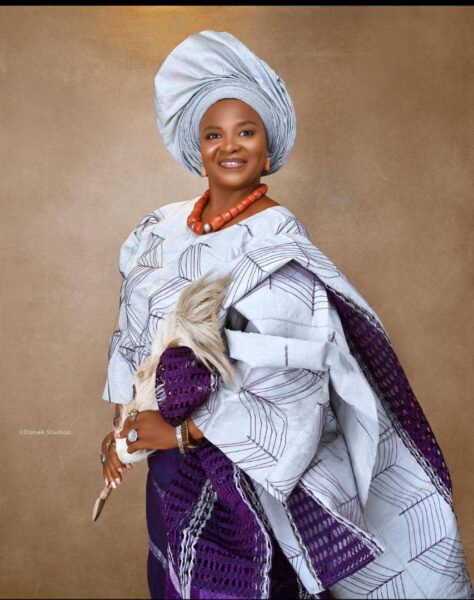Breaking News
BREAKING NEWS STATE OF THE NATION: On the Nigerian Old and New National Anthems
In her view again, the change is neither here nor there, stating that, “the Nigerian National Anthem has undergone a significant transformation over the years, reflecting the country’s growth, struggles, and aspirations.These are two very rich songs! The question is: Are the leaders and the citizens obeying the words of these Anthems, could they and would they ever obey it !?

“Revert to the old constitution of 1963” – Funmilayo Adesanya-Davies
Presidential candidate of Mass Action Joint Alliance (MAJA) in 2019, a Professor of Applied Linguistics and Communication Arts, Funmilayo Adesanya-Davies, at IAUE, Port Harcourt has broken her silence to speak on the controversies on the change from the Old National Anthem to the new National Anthem in Nigeria.
The don, linguist and political commentator says, “It’s a welcome development to have reverted to the old National Anthem, because it’s simpler, it’s about motherland and not fatherland and may actually cause Nigerians a rethink especially in view of the current state of insecurity, and lack of peace, unity and progress in the nation; but it’s not yet ‘Uhuru’ until the processes of change are completed”.
She explained, “‘It’s not yet Uhuru’ untill this change to the past, also leads to the change to revert to the 1963 old constitution. She called on President Bola Tinubu to give the reversion to the 1963 constitution a shot immediately, without looking back and as a matter of urgency in order to justify the reversion to the old national anthem.
Adesanya-Davies said, “It’s not just time to revert to the old National Anthem of 1960 but it’s time to revert to the old constitution, re-negotiate and regionalize Nigeria along the deliberations of the pending report of the 2014 National Confab by Nigerians during former president Goodluck Jonathan’s presidency. “Time is also ripe to create special nomenclature for the restructuring and regionalisation of the nation, Nigeria and the time is now!” She added.
In her view again, the change is neither here nor there, stating that, “the Nigerian National Anthem has undergone a significant transformation over the years, reflecting the country’s growth, struggles, and aspirations.These are two very rich songs! The question is: Are the leaders and the citizens obeying the words of these Anthems, could they and would they ever obey it !?
To her, “Obedience is the very best way to show what we believe and “Obedience is better than sacrifice,” according to the Holy Writ. If one compares and contrasts the old and new Nigerian National Anthems, exploring their historical context, lyrics, and symbolism, they are both unique, excellent and of great thoughtfulness and national significance.”
The old National Anthem, “Nigeria, We Hail Thee,” was adopted in 1960, following Nigeria’s independence from British colonial rule. The anthem was written by Michael Imoudu, a renowned Nigerian musician, and was sung to the tune of “God Save the Queen.” The lyrics celebrated Nigeria’s rich cultural heritage, its people’s resilience, and the country’s new found freedom, it was just what Nigeria needed then.
In contrast, the new National Anthem, “Arise, O Compatriots,” was introduced in 1978, during the military regime of General Olusegun Obasanjo. The new anthem was written by Benedict Odiase, a Nigerian poet, and was set to a new melody composed by Nigerian musician, Pa Benedict Odiase. The lyrics emphasize unity, patriotism, and the country’s determination to build a better future and it’s national patriotic content cannot be uncelebrated and over-emphasized.
However, one significant difference between the two anthems is their tone and focus. The old anthem had a more celebratory tone, emphasizing Nigeria’s achievements and cultural heritage, which was needed as at the time. In contrast, the new anthem has a more aspirational tone, emphasizing the need for unity and collective effort to build a better future, which was the best for the time.
Another notable difference is the language and imagery used in the two anthems. The old anthem employed more colonial-era language and imagery, reflecting Nigeria’s recent history as a British colony, which was the need to a later change. In contrast, the new anthem uses more indigenous language and imagery, reflecting Nigeria’s growing sense of national identity and pride, which is what we need now.
Despite these differences, both anthems share a common goal – to inspire patriotism and national unity among Nigerians. Both anthems also recognize the country’s rich cultural heritage and its people’s resilience and determination and so the change is inconsequential unless we revert also to the old constitution of 1963.
To conclude, the old and new Nigerian National Anthems reflect the country’s evolution and growth over the years. While the old anthem celebrated Nigeria’s independence and cultural heritage, the new anthem emphasizes unity, patriotism, and the country’s aspirations for a better future. Both anthems remain important symbols of Nigerian national identity and continue to inspire patriotism and unity among Nigerians.
Therefore, “It’s not just time to revert to the old national anthem of 1960 but it’s high time we reverted to the old constitution, which was used during that same national anthem. It’s time to re-negotiate, regionalize Nigeria and make the country work for once!
Long live the federal republic of Nigeria!









